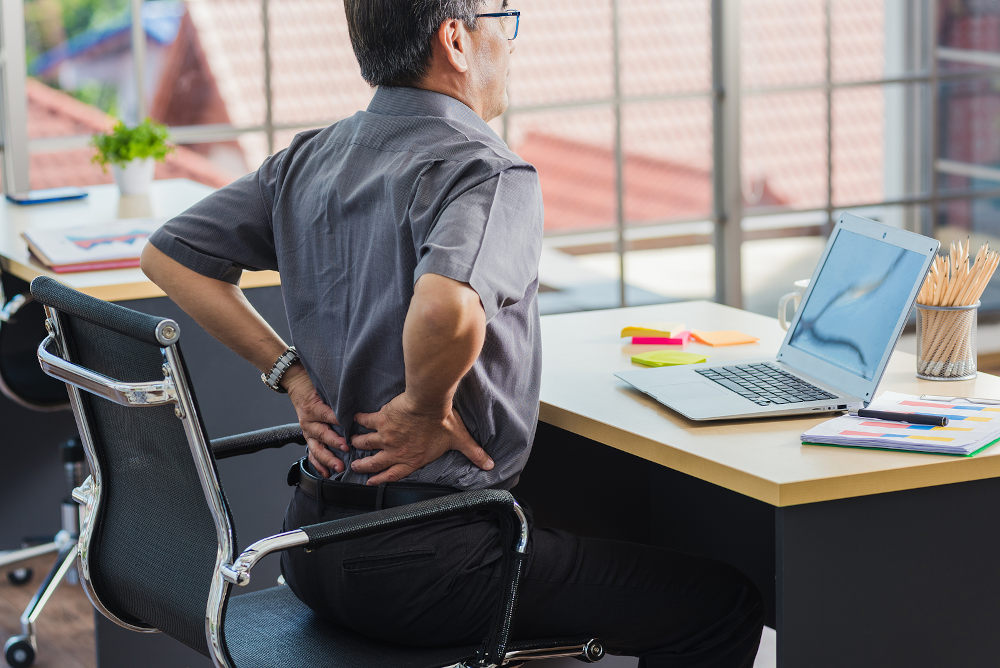It can be difficult to enjoy a rich, varied and fun life if you’re suffering with constant or recurring back pain. Though it’s a common condition that affects millions of people around the world, many are unsure of the specific cause – do you know what’s causing yours?
A variety of factors, both lifestyle and health related, can be to blame and there isn’t always a simple fix, but there are some things you can do to ease your suffering, especially if it’s something you’re doing every day that is causing you these issues.
From poor posture to injury and even stress, alongside conditions like cauda equina, there are various unexpected causes of back pain that you may not be aware of. We are here to help you get to the bottom of what might be causing you this pain as well as provide some useful tips to help relieve your symptoms.
Potential health-related causes of back pain

Cauda equina syndrome
Cauda equina is a bundle of nerves that originate from the lower end of the spinal cord and extend below the level of the spinal cord into the lower back and legs.
The nerves of the cauda equina are responsible for transmitting sensory and motor signals between the lower body and the brain and they also play a crucial role in controlling bladder and bowel function. A medical emergency occurs when the nerves of the cauda equina become compressed or damaged, this can be caused by a herniated disc, spinal stenosis, or other conditions that put pressure on the nerves.
Urgent medical attention is required if someone is experiencing symptoms of cauda equina syndrome (severe low back pain, numbness or tingling in the legs or feet, weakness in the legs or feet, and loss of bladder or bowel control) and there are occasions which could lead people to seek out successful cauda equina claims.
Herniated discs
A herniated disc occurs when the soft tissue between the vertebrae pushes through a crack in the tough exterior. This can cause nerve compression, leading to pain in the back, as well as tingling, numbness, and weakness. Pain can be eased by alternating heat and cold, avoiding too much bed rest and resuming activity slowly.

Spinal stenosis
Spinal stenosis is a narrowing of the spinal canal, which can put pressure on the nerves in the back. This condition can lead to pain, as well as numbness and weakness in the legs. Nonsteroidal anti-inflammatory drugs (NSAIDs), like ibuprofen, can help with pain and inflammation, but it’s always best to talk to your GP first.
Osteoarthritis
Osteoarthritis is a degenerative joint disease that can affect the spine. This condition can cause stiffness, pain, and swelling in the joints of the back, as well as a reduced range of motion. A cold pack could be helpful in the early stages of a flare-up, while heat from a bath or heating pad can relax muscles and sooth pain afterwards, according to the Arthritis Society.
Fibromyalgia
Fibromyalgia is a chronic pain disorder that can cause pain throughout the body, including the back. This condition is characterised by tender points in the muscles and connective tissues, as well as fatigue, sleep disturbances, and cognitive difficulties. Gentle exercises like yoga, walking and swimming can help in the long term, while heat and cold therapy can be helpful for short term pain.
Potential lifestyle causes of back pain

Your shoes
Did you know that your shoes could be contributing to your back pain? Wearing shoes with improper support or cushioning can lead to misalignment of your feet and spine, which can cause pain in your lower back.
High heels can also place additional pressure on the lower back, leading to discomfort. If you’re experiencing back pain, it may be worth investing in a good pair of shoes with proper support and cushioning to see if it helps alleviate your symptoms. Nothing beats a properly fitting pair of trainers.
Your sleeping position
Your sleeping position can also play a role in causing back pain. Sleeping on your stomach can place strain on your neck and lower back, while sleeping on your side can cause your spine to twist and lead to discomfort.
The best sleeping position for your back is on your back with a pillow under your knees to help maintain the natural curve of your spine. If you’re experiencing back pain, try changing your sleeping position to see if it makes a difference.
Your diet
Believe it or not, your diet can also contribute to back pain. Consuming foods that are high in inflammatory substances like sugar, trans fats, and processed foods can exacerbate inflammation throughout the body, including in the back. This can lead to pain and discomfort.
Consuming foods that are high in anti-inflammatory substances like omega-3 fatty acids, fruits, and vegetables can help reduce inflammation and alleviate back pain.

Your emotions
Stress and other negative emotions can also contribute to back pain. When you’re feeling stressed, your body releases hormones like cortisol that can lead to muscle tension and inflammation, which can cause pain in the back.
Additionally, when you’re feeling anxious or depressed, you may be more likely to adopt poor posture or engage in activities that aggravate back pain. If you’re experiencing back pain, it may be worth considering whether your emotions could be contributing to your symptoms.
Your mobile phone
Finally, your mobile phone could be contributing to your back pain. When you look down at your phone, you place additional strain on your neck and upper back, which can lead to discomfort. This is often referred to as ‘text neck’.
Over time, this strain can lead to chronic pain in the back and neck. To prevent this, try holding your phone at eye level and taking frequent breaks from your device.
Final thoughts
If you’re experiencing back pain, consider whether any of these causes could be contributing to your discomfort and take action to address them. With the right approach, you can manage your back pain and improve your overall quality of life.
Please be advised that this article is for general informational purposes only, and should not be used as a substitute for advice from a trained medical professional. Be sure to consult a medical professional or healthcare provider if you’re seeking medical advice, diagnoses, or treatment. We are not liable for risks or issues associated with using or acting upon the information on this site.






















